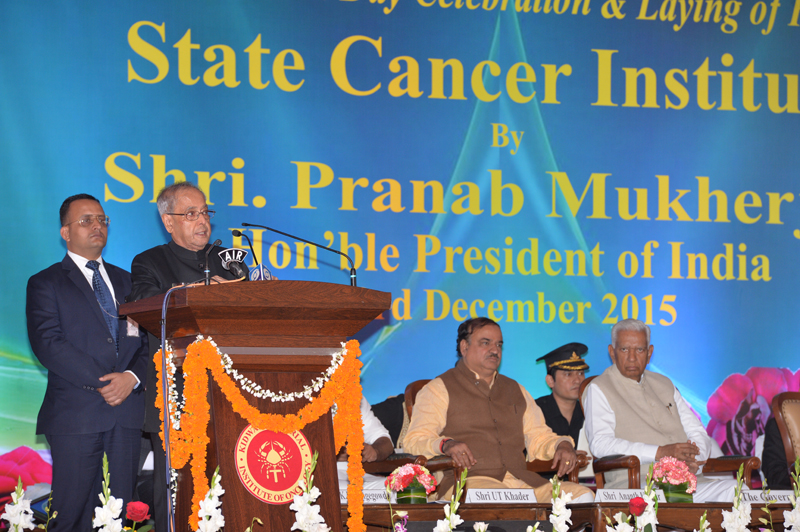
1.At the outset, I would like to express my sincere thanks for extending me the invitation for the Foundation Stone laying ceremony of the State cancer Institute at this prestigious Kidwai Memorial Institute of Oncology in Bengaluru. This city, which is known as the Silicon Valley of India, can truly take a lead in the management of cancer treatment by adopting latest technologies and best global practices. I am happy to see this happening today and I would like to compliment the management for their efforts in taking on the challenges of one of the most dreaded diseases on the planet.
2.The unabated spread of cancer continues to be a matter of great concern for every one of us. Of late, several programmes have been initiated at the national, provincial and regional levels aiming at preventive, curative and palliative care. These measures while being significant, remain inadequate for the ever entrenched and growing problem of cancer.
3.Documented findings which reveal exponential growth in the incidence of various kinds of cancers, warrant not only scientific but sustained and consistent efforts to effectively pave the way for structuring strategies aimed at proper planning, guiding, monitoring and evaluation of cancer control programmes.
4.The incidence of cancer has been increasing worldwide and India too is showing a steep increase in cases over the years. From the data available with the National Cancer Registry Programme of ICMR, it has been estimated that on an average, one in about fifteen men and one in about twelve women in the urban centres would be at risk of developing cancer in their lifetime. These figures, coupled with our rapidly growing population, underlie the challenge that the medical fraternity and policy planners will face in cancer mitigation and prevention.
5.Efforts have been made by the Indian Council of Medical Research to make cancer a notifiable disease on a national basis with the objective of generating authentic data on cancer and associated issues which will help to map the resources for diagnosis, treatment and cancer control. Reliable data will help in understanding the magnitude of this disease and formulating a more comprehensive and nuanced cancer care policy for the nation. Early detection is normally a game changer in the overall treatment and management of cancer which will get a boost with reliable data.
Ladies and Gentlemen,
6.In India, it is a matter of great concern that a vast majority of cancer afflicted patients are reporting with an advanced disease at the time of presentation. With the majority of our population residing in rural areas, the facilities for early detection, diagnosis, treatment and palliative care are sub-optimal. We need to develop a system for early detection and proper disease management. We need to explore how technology can be best utilised for both prevention of cancer and its treatment. An appropriate and well defined communication strategy will be one of the key factors in the fight against cancer.
7.Affordable healthcare is still a challenge for us. The cost of cancer treatment has been increasing owing to huge investments on trained manpower and equipment that are necessary for treatment. The Governments, both at the Centre and States, are making their best efforts for increasing the affordability of cancer treatment. Sustained and collaborative multi-agency effort is needed to minimize the suffering of patients and their families.
8.Improved literacy, greater consciousness about health in general and awareness about cancer in particular makes more and more people seek medical advice at an early stage. Access to sophisticated and improved diagnostic methods helps in detection of tumours that would have been missed in earlier times. This has led to increased demand for cancer-treatment in India. All-round development and improved access to health further increase the number of patients. Our health infrastructure should be expanded optimally to meet these challenges.
9.The National Cancer Control Programme for India made several recommendations, such as establishing oncology wings in medical colleges to extend cancer care facilities to as many people as possible. Besides this, several regional cancer centres have been upgraded to State Cancer Institutes by the Central Government through provision of adequate funding to build infrastructure and procure state-of-the-art equipment necessary for diagnosis and treatment of cancer. One of the beneficiaries of this drive in the State of Karnataka is the Kidwai Memorial Institute of Oncology. This institute has been in existence since four decades and is one of the premier regional cancer centres for treatment and research on cancer. This Institute is providing cancer care facilities to the people of the State as well as to patients seeking care from other parts of India.
10.Today is a momentous day in the history of this institute, which is taking a major leap towards extending state-of-the-art cancer care facilities to poor patients. We have to declare an all out offensive against cancer and achieve a decisive victory through active collaboration and participation of Government, industry and academia. I hope that this Institute will continue to serve people and the nation by being a major player in India’s war against cancer. My best wishes to you all in your efforts at containing and one day, hopefully eliminating this scourge.
Thank You.
Jai Hind.
